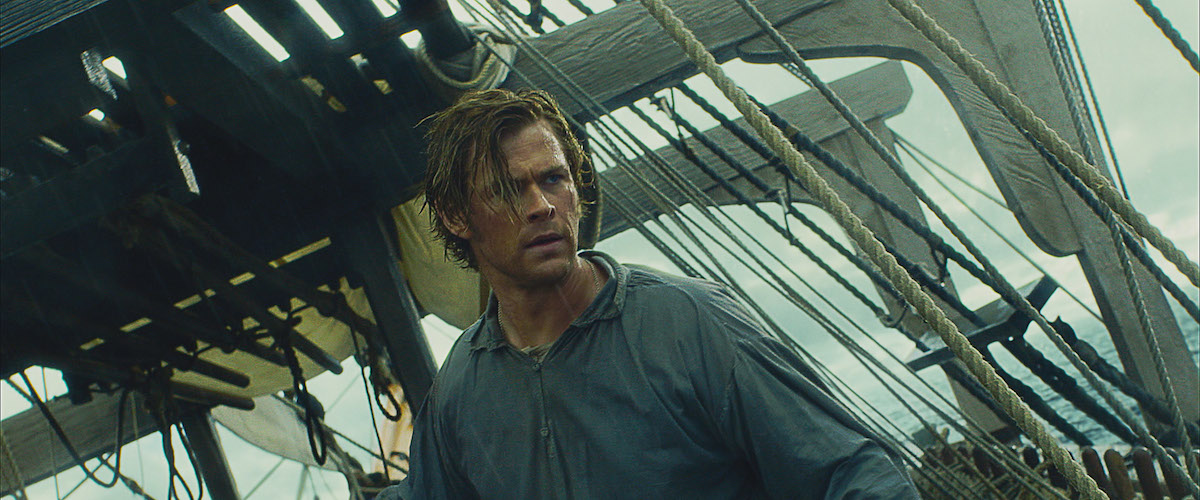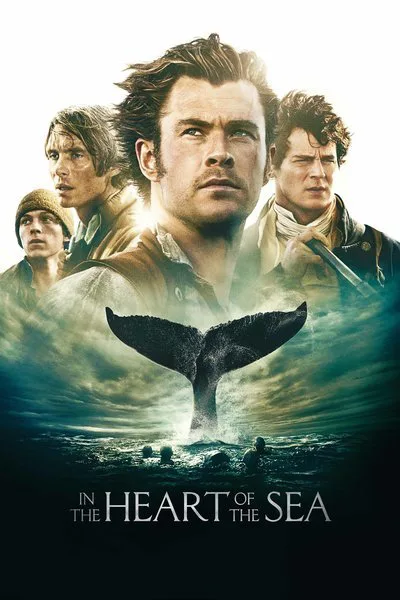What is “In the Heart of the Sea” about? There are so many ways to answer that question. You could say that Ron Howard’s latest feature, adapted from Nathaniel Philbrick’s acclaimed nonfiction book “In the Heart of the Sea: The Tragedy of the Whaleship Essex,” is about the real incident that partly inspired Herman Mellville’s novel “Moby-Dick”—the 1820 destruction of a whaling vessel by a murderously angry sperm whale. You could say that it’s about the relationship between nonfiction and fiction, though here things get dicey: the film’s story is told in a characteristically clunky framing device to the young Melville (Ben Whishaw), even though in reality Melville wrote his novel without ever visiting Nantucket. (Howard told Charlie Rose that Melville interviewed the last survivor of the wreck, though, so there may be a tether of fact here.) You could say the film is about humankind’s collective, slowly dawning realization that whales are not big fish but intelligent mammals, and that the whaling industry was (and still is) engaged in interspecies genocide—a notion teased out in shots of the vengeful whale and other members of its pod floating peacefully with their calves underwater, then surfacing to stare accusingly at the humans. You could say it’s a survival story, about a group of shipwreck survivors (led by an unqualified rich-boy captain, played by Benjamin Walker, and Chris Hemsworth’s macho and resentful first mate) dying of hunger and thirst in lifeboats. Lastly, you could describe “The Heart of the Sea” as a story of corporate ethics: the final section shows the whaling company urging survivors to lie about what happened, for fear that insurance carriers won’t cover them if they hear that a whale is capable of destroying a huge ship.
None of these descriptions are wrong. But none of them captures the film. And boy, did this film need capturing. It’s not inspired enough or controlled enough or deep enough to roam all over the place, being six or seven or eight things at the same time. If “In the Heart of the Sea” were a dark picaresque adventure of overwhelming physicality, directed by a philosophically inclined director like Werner Herzog or Terrence Malick, every piece of it might be united by particular ideas, or at the very least a certain sensibility, even if didn’t hang together at the level of story. But Howard isn’t that sort of director. He needs his incidents to be unified by what Steven Spielberg once called “an idea you can hold in your hand.” That’s why his best film is “Apollo 13,” a film about a diverse group of driven, loyal, talented individuals coming together to solve a problem.
And this is ultimately what damages “In the Heart of the Sea” more than anything else: it is so very many different things, but they all feel detached from each other, almost like a bunch of self-contained mini-movies stitched end-to-end, with the framing device serving as needle and thread. And the framing hurts the film more than it helps. Setting aside the questionable conceit of having Melville sit there and jot down the story of a sailor (Brendan Gleeson in the present-day scenes, Tom Holland as his younger self) as research for his book—which tends to reduce novel writing to transcribing stuff that happened—it’s mostly intrusive and clumsy, often interrupting thrilling action sequences when they’re building a head of steam to interject an observation or humorous aside. Granted, this could be screenwriter Charles Leavitt’s attempt to create a cinematic equivalent to Melville’s tendency to interrupt his narratives with passages, sometimes chapters, about nautical history and tradition and the creatures of the sea, but whatever the intent, the scenes thud like a bucket of fish guts dropped on a wooden deck.
And by the time you get to the end of the picture, they become a strange kind of sub-narrative about how confession is good for the soul, or perhaps a harbinger of the age of Sigmund Freud’s talking cure. It’s anachronistic, though no more so than some other touches in the film, such as the scenes where the whalers wonder if they’re wrong to be killing whales (I can’t really see that happening in 1820, can you?), or the bits where Gleeson’s brokenhearted sailor explains to the young Melville that the whale oil industry is the equivalent of the petroleum industry today, and hey, did you hear the news that some guy drilled a hole in the earth and pulled oil right out of the ground?
In fairness, it’s very hard for storytellers to get out of a modern-day mindset, disentangle themselves from their presumed state of enlightenment (a state that always seems considerably less enlightened to future generations) and ask the audience to enter into the worldview of characters from another era and find them fascinating in their own right, regardless of whether they find them entirely sympathetic and agree with every one of their values. But some of the best historical films and TV series at least try to do such a thing, resisting the urge to flatter modern viewers by inserting scenes, or in some cases characters, who are supposed to represent the “modern” point-of-view on X or Y. “In the Heart of the Sea” does that quite a bit. Each time it makes the film seem less committed to the story it has spent tens of millions of dollars to bring to the screen.
Touches that might seem fiercely ironic in different filmmaking hands—such the moment when Hemsworth’s first mate, Owen Chase, tries to harpoon the vengeful whale for the second time, but freezes after staring into one of its huge, curious eyes—seem merely silly here. Chase’s attack of conscience could be a nod to that moment in “The Deer Hunter” when Robert DeNiro’s newly-returned war veteran realizes he’s lost the urge to shoot bucks, but whatever its intent—and regardless of whether it comes straight from the book—it seems contrived and not credible. Are we to believe that a man who spent most of his adult life killing whales would hesitate before throwing his harpoon again when his own life and those of his crew were at stake? Really? This is, pun completely intended, a high watermark for the inappropriate superimposition of modern attitudes on stories about people from another time, although one look at Hemsworth, with his gym-sculpted pecs and abs and what looks suspiciously like shampooed and conditioned hair, should clue us in that the filmmakers are going to be selective about keeping things in-period. If Herzog had done the scene, we might at least have found it amusing that Chase started thinking like a 21st century environmentalist long after it could have done him or his fellow sailors any good.
The film remains watchable anyway, thanks to Anthony Dod Mantle’s cinematography, the superb supporting cast (which includes Cillian Murphy as a veteran second mate), and the sheer scale of its production. Much of the seafaring action was shot on a full-scale, working replica of the Essex, with actors (including Hemsworth) scampering up and down masts in long crane shots so you know it’s really them. And the whales, created through CGI and puppetry, are so magnificent that I wouldn’t have minded watching them for two hours floating around and talking to each other in subtitled whalesong. A version of “Moby-Dick” told entirely from the whale’s point-of-view might be fascinating; at the very least it would be more fascinating than this impressively enormous and impassioned but disjointed film, which combines elements of “Jaws,” “Orca,” the self-help book, the corporate ethics thriller, and the “How low do you sink when you’re stuck in a lifeboat together?” movie, but that, narratively speaking, never leaves port.




















